
7 best free open source business intelligence tools right now
Contents
Not everyone has money to dish out for an enterprise Tableau contract, and not everyone wants to send their data to Looker (Google) either.
Free and open source business intelligence tools solve both these problems by making BI accessible and keeping you in control of your data.
The challenge becomes choosing the best one. To help you, we've put together this list of the top free and open source business intelligence tools you can use.
How are these tools being evaluated?
We evaluated these tools based on their:
- Ability to connect to data sources, query them with SQL, and build dashboards
- Their open source credentials (GitHub stars, license, etc.)
- Their unique positioning in the business intelligence space
What is the best business intelligence tool for startups?
PostHog provides startups like HeadshotPro, with a full suite of tools they need to build a great product, including pre-built web and revenue analytics dashboards, simple connectors for their existing data sources (Postgres, Stripe, Hubspot, etc.), and a bunch more.
What is the best business intelligence tool for data analysts?
Metabase provides a comprehensive set of database connectors as well as powerful query building and visualization tools that make it easy for data analysts to build dashboards and insights.
What is the best business intelligence tool for infra engineers?
Grafana provides engineers with the "intelligence" their looking for: observability, monitoring, and more for their infrastructure. They also provide a ton of plugins for all the tools and services engineers use.
What is the best business intelligence tool for product managers?
Because it can easily combine product and business data, PostHog is the best business intelligence tool for product managers. It enables them to get a complete view of their product while also providing the advanced SQL querying they need to go deeper.
What are the best free and open source BI tools right now?
1. PostHog
- License: MIT
- GitHub stars: 25.6k
- PostHog on GitHub

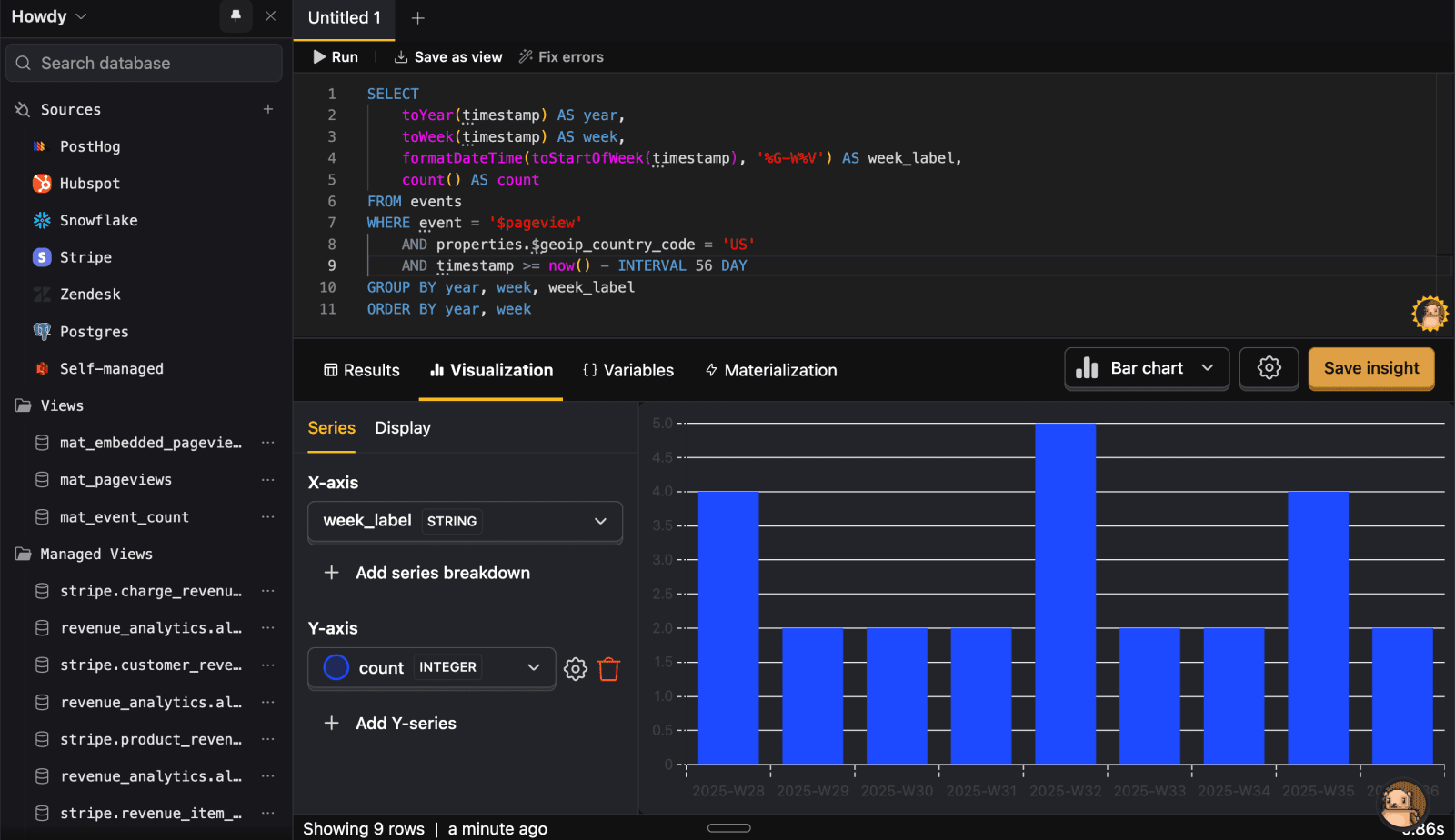
PostHog is an open source, all-in-one platform that combines business intelligence with several other developer-focused tools, such as product and web analytics, session replay, experiments, error tracking, and surveys.
Its business intelligence stack contains three key pieces:
A data warehouse that stores data captured into PostHog and syncs with external sources you already use, like Stripe, Hubspot, Postgres, Google Sheets, S3, Snowflake, and more.
Product analytics which provides a simple but powerful interface for building dashboards and insights including trends, funnels, retention graphs, user paths, and more.
An SQL editor for direct access to your data along with its own set of visualizations and customization.
What makes PostHog special?
PostHog has the flexibility of a business intelligence tool, while including a full suite of tools product and engineering teams need to build successful products. You have less data spaghetti trying to connect them all together.
For example, not only can you analyze A/B tests from warehouse data in PostHog, but you can actually set up and run them natively using our experimentation and feature flag products. You don't need to set up four different products, just PostHog.
FAQ
What tools does PostHog replace?
PostHog is less of a traditional replacement for tools like Looker and Tableau and more a replacement for your suite of dev tools like Amplitude, Mixpanel, Fullstory, LaunchDarkly, Hotjar, Sentry, and Survicate.
Can it connect to my data warehouse?
Yes. PostHog can connect to many of the popular data warehouse providers including S3, R2, GCS, Snowflake, BigQuery, and more.
Is there a hosted version?
Yes. PostHog's hosted Cloud version and all of its business intelligence features are free to use. It comes with 1 million events and 1 million rows synced for free every month. Beyond this, pricing is usage-based and totally transparent.
Does PostHog have AI query generation?
Yes. PostHog AI can generate and fix SQL queries for you, answer questions about your data, and more.
2. Metabase
- License: AGPLv3
- GitHub stars: 43.6k
- Metabase on GitHub
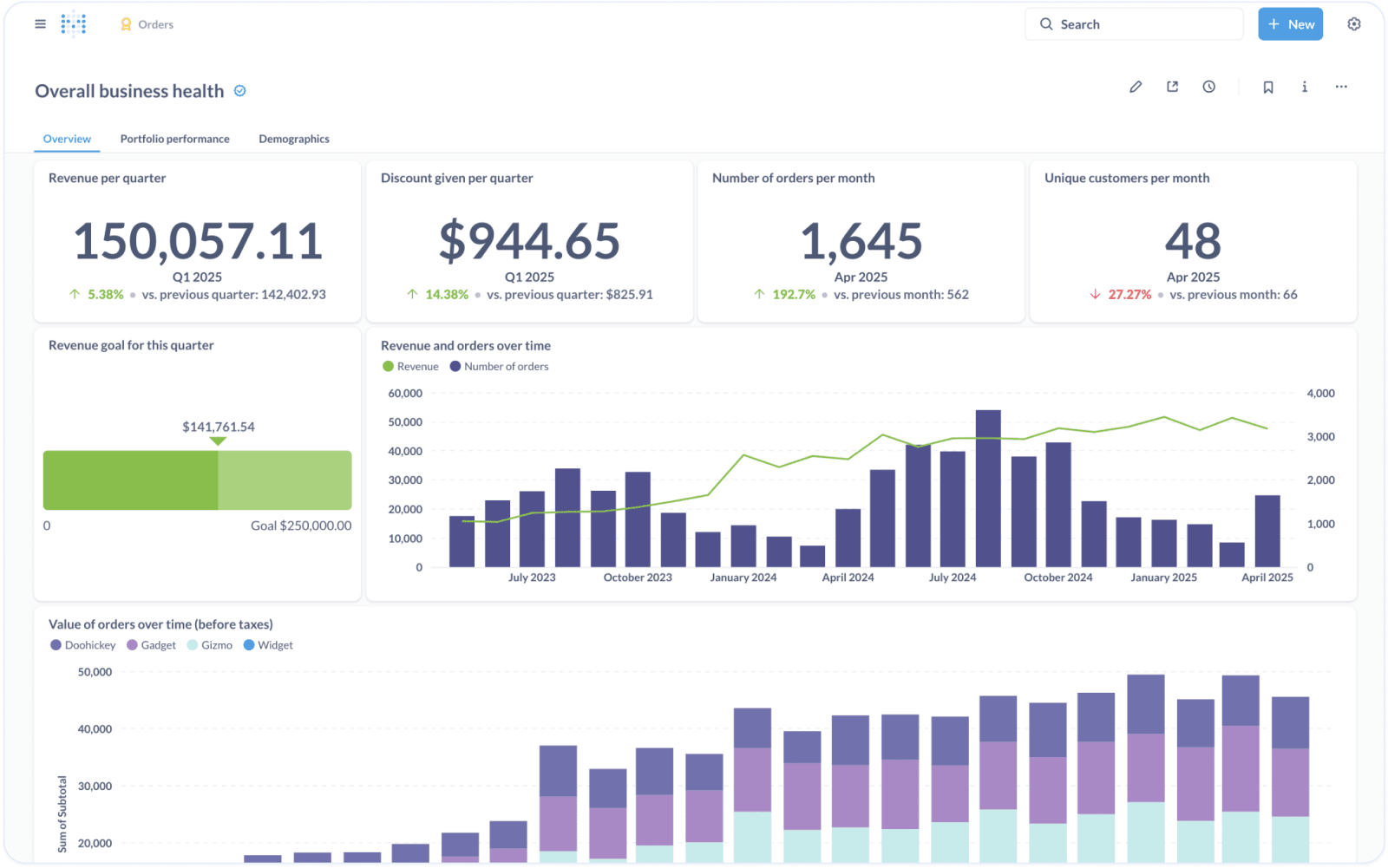
Metabase is an open source analytics tool that easily connects to your existing database.
Once connected, Metabase offers an easy to use and powerful query builder. Visualizations can be built with or without SQL. Within these, users can drill down to filter, breakout, or view the source table.
Once built, Metabase then enables teams to build and organize with dashboards and collections. They also provide permissioning to ensure only the right people have access to sensitive insights.
What makes Metabase special?
Metabase is praised for its simplicity. It really is easy to connect to a data source and start querying fast. Its visualization builder is just as simple, with a clean UI that doesn't require a power user to figure out. This means non-analysts can self-serve their data needs.
FAQ
What tools does Metabase replace?
Metabase is a simpler alternative to BI tools like Tableau, Power BI, and Looker, but it misses some of the powerful data modeling that these tools provide. It is also similar to the SQL + viz tools like Mode, Superset, and Redash.
Can it connect to my data warehouse?
Metabase can connect to a bunch of popular databases including BigQuery, ClickHouse, Databricks, MongoDB, PostgreSQL, Redshift, Snowflake, and more.
Is there a hosted version?
Metabase Cloud provides a fully managed Metabase instance hosted in your region. They offer a free 14-day trial, then starts at $85 per month plus $5 per month per user.
Does Metabase have AI query generation?
Yes. Metabot lets you generate SQL queries, summarize charts, and answer docs questions.
3. Superset
- License: Apache 2.0
- GitHub stars: 67.9k
- Superset on GitHub
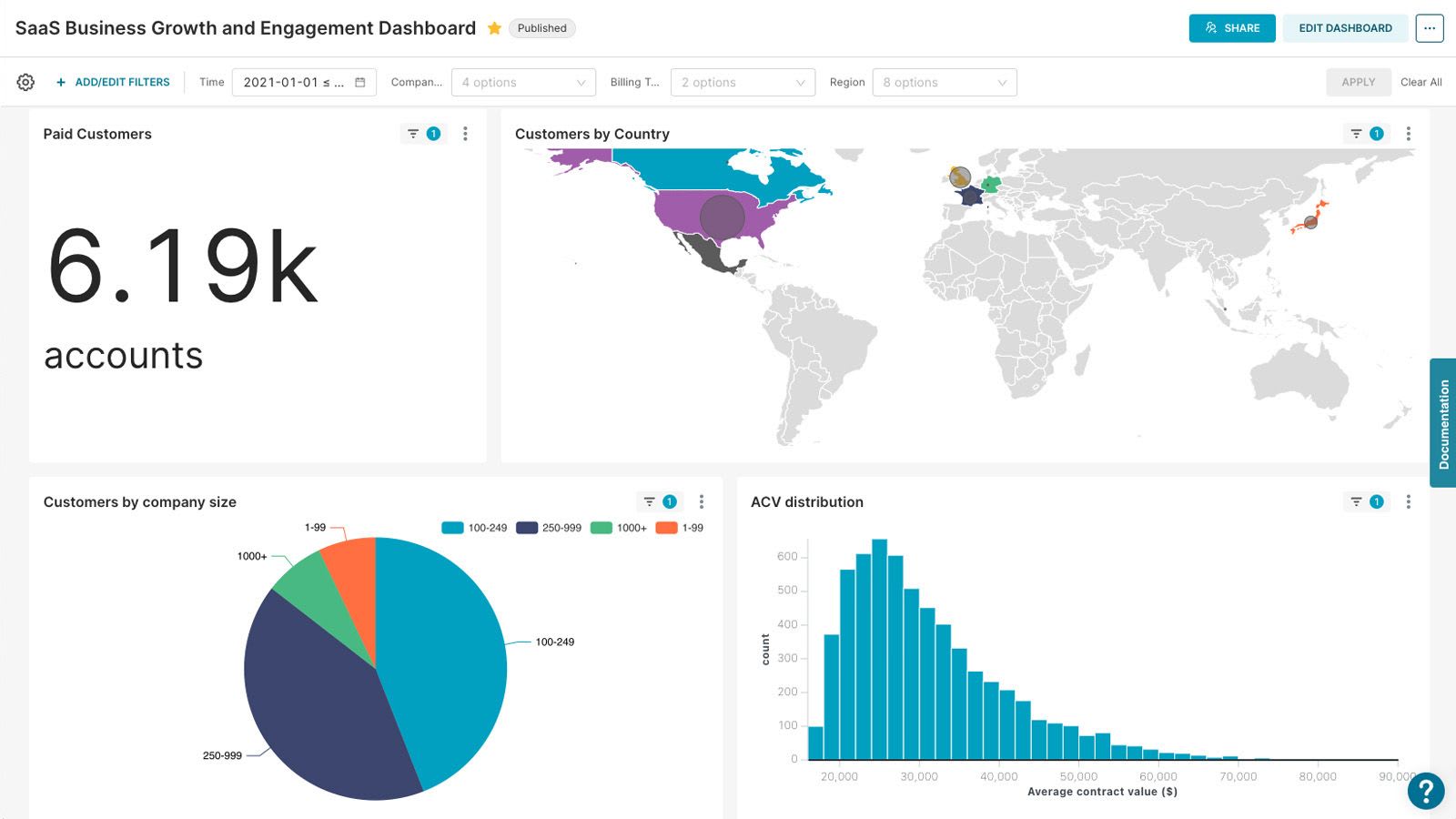
Apache Superset is a modern, open source exploration and visualization platform. Superset formed out of a 2015 Airbnb hackathon project.
It provides both no-code and SQL options for queries and 40+ pre-installed visualizations. In terms of “modernity”, it's lightweight, scalable, and integrates with any SQL-based database, including cloud-native and petabyte-scale ones.
What makes Superset special?
Superset provides a few meta tools for making insight creation easier.
- A semantic layer for quickly defining custom dimensions and metrics. These abstractions map SQL to be more human-friendly.
- Datasets which are subsets of data that make chart creation easier and queries more performant. This aims to be a middle point between a query-centric approach and a semantic-centric one.
FAQ
What tools does Superset replace?
Like Metabase, Superset generally replaces business intelligence tools like Tableau and Power BI as well as SQL + viz tools like Mode and Metabase. On top of this, its semantic layer is a lighter version of LookML and dbt metrics.
Can it connect to my data warehouse?
Superset can query data from any “SQL-speaking” datastore or data engine including Redshift, BigQuery, Snowflake, PostgreSQL, Databricks, and more.
Is there a hosted version?
Preset provides a scalable, enterprise-hosted version of Superset. It's a company founded by the creator of Superset, Maxime Beauchemin.
Does Superset have AI query generation?
Preset's AI Assist lets you write SQL queries with ease, but is only available on their professional and enterprise plans.
4. Grafana
- License: AGPLv3
- GitHub stars: 69.8k
- Grafana on GitHub
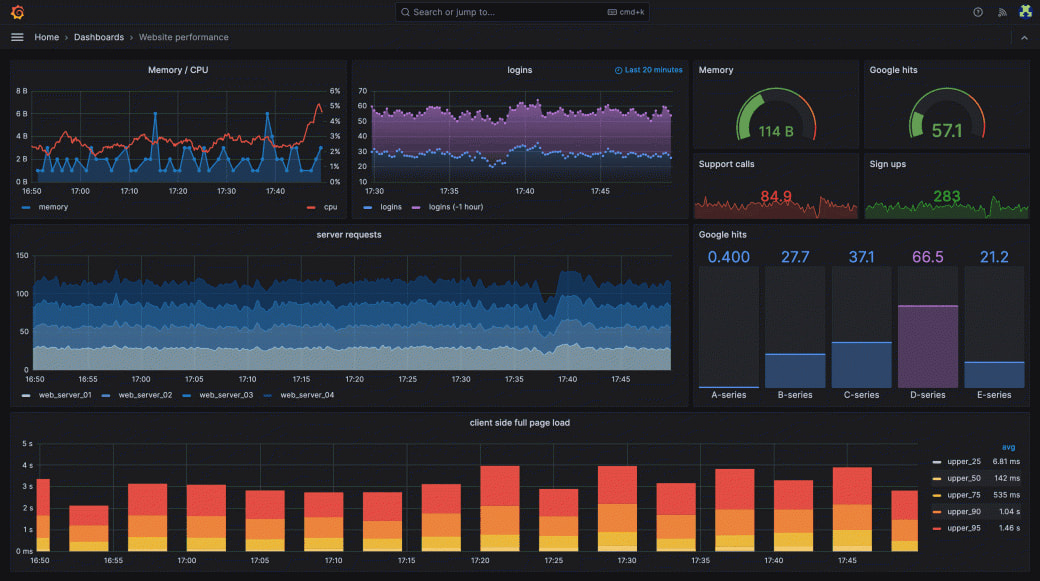
Grafana is an open source observability platform that centralizes metrics, logs, traces, and profiles. It provides observability for big infrastructure providers, monitoring for popular services, and connectors for other tools.
Once all this data is captured or connected, Grafana provides over 100 data visualization options to build all sorts of dashboards. It also provides more tools for making use of this data like alerts, transformations, and annotations.
What makes Grafana special?
Grafana is one of the most mature tools on this list. It was founded in 2014, is valued at over $6B, has acquired companies like k6 and Amixr to add to its product suite, and has a massive library of data source and visualization plugins.
This means they are very popular with their core customer: infrastructure engineers. For these people, they provide a majority of tools they need like logging with Loki, tracing with Tempo, metrics with Mimir, and visualization with Grafana.
FAQ
What tools does Grafana replace?
Grafana focuses on replacing monitoring visualization, and logging tools like Kibana, Datadog, New Relic, and Splunk.
Can it connect to my data warehouse?
Grafana can query a bunch of tools you already use like Snowflake, Splunk, Datadog, Linux, AWS, Docker, ClickHouse, PostgreSQL, Redshift, and more.
Is there a hosted version?
Grafana Cloud provides all the key features of Grafana without the overhead of maintaining your own stack. Its free tier provides 10k metrics, 50GB logs, traces, and profiles with a 14-day retention, and more.
Does Grafana have AI query generation?
Some data sources, like Azure Data Explorer, have AI query generation. Grafana has other AI features though, like incident summarization.
5. Evidence
- License: MIT
- GitHub stars: 5.5k
- Evidence on GitHub
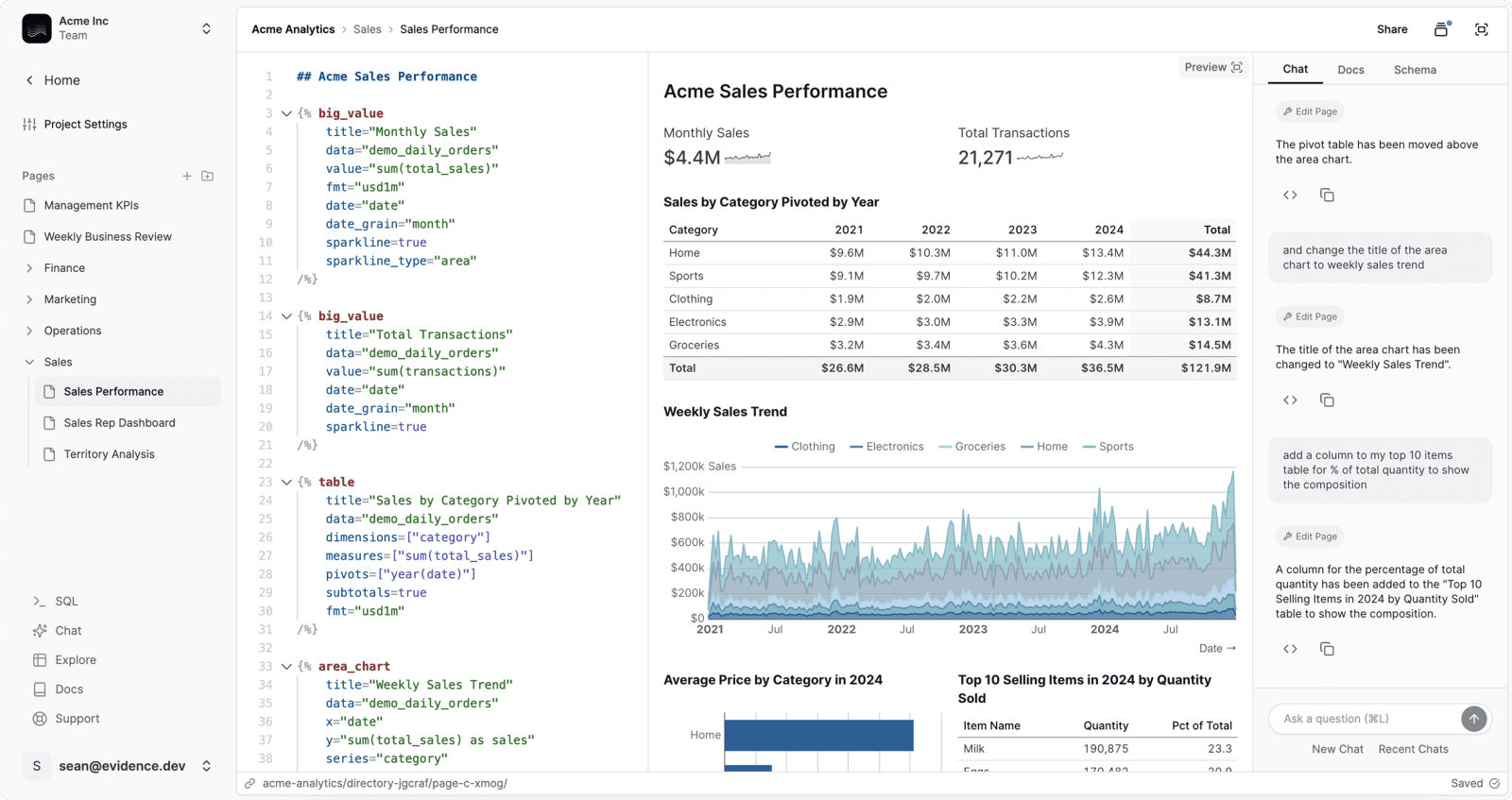
Evidence is a modern frontend for data work. It focuses on providing a modern design and dev experience for building polished and performant data products like articles and dashboards.
It has focused on ensuring its query engine provides high performance on huge queries, and its data products provide a high quality experience for both internal and external teams.
The cloud version also has SOC 2 certification, row-level security, and other features enterprises expect from tools like these.
What makes Evidence special?
In Evidence, everything is code. This means it combines SQL, markdown, and its templating language to provide a simple, but powerful development environment for their data products.
It also means they can do real-time syntax validation, version control, and testing. The cloud version adds AI tools to help users generate and edit this code based on natural language.
FAQ
What tools does Evidence replace?
Evidence replaces the standard suite of dashboard builders like Tableau, Looker, and Power BI as well as the data notebook tools like Hex and Jupyter.
Can it connect to my data warehouse?
Evidence can be configured to connect to a range of data sources like BigQuery, Snowflake, Redshift, PostgreSQL, Databricks, and more.
Is there a hosted version?
Evidence Studio is the cloud version of Evidence. Released in June 2025, it provides a more expressive syntax, a fully web-based dev environment, and agentic AI to help you write queries.
Does Evidence have AI query generation?
Evidence's AI agent can look up documentation, check your schema, and write queries (and Markdown) for you.
6. Redash
- License: BSD-2
- GitHub stars: 27.7k
- Redash on GitHub
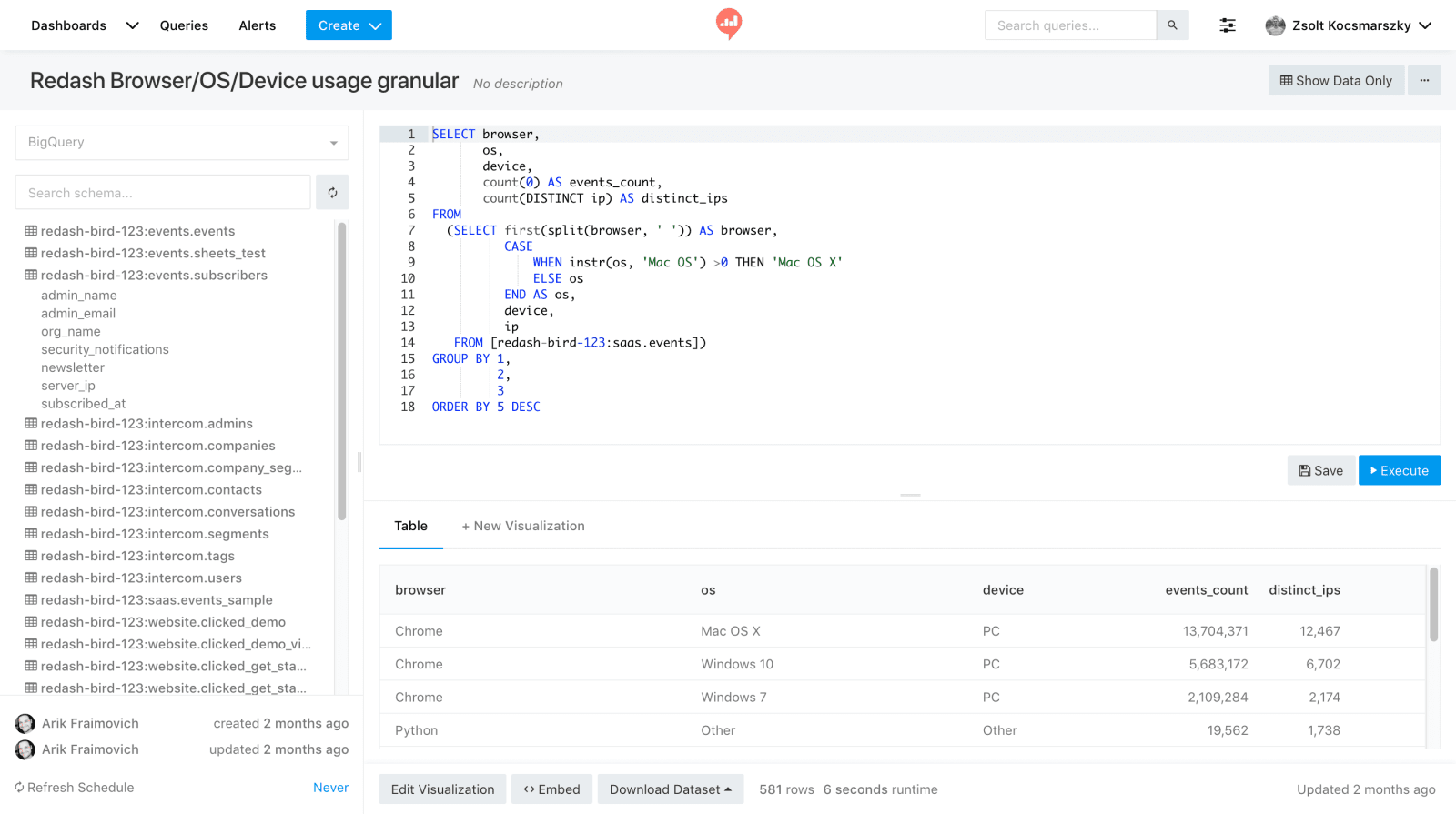
Redash is a tool that enables you to easily connect to your data sources, query them with SQL, and build dashboards for your team.
It supports a range of:
- SQL, NoSQL, big data, and API data sources from Redshift to MySQL to Postgres.
- Charts and visualizations from boxplots to maps to funnels.
Beyond this, Redash also provides alerts, an API to extend its functionality, SSO, and access controls.
What makes Redash special?
Redash is a narrower product than the other alternatives on this list. It focuses more on:
- Providing a great query writing experience with autocomplete, keyboard shortcuts, snippets, and results caching.
- Creating useful dashboards with their collection of visualizations and sharing tools.
Because of this simpler feature set, Redash can be simpler and lighter to self host.
FAQ
What tools does Redash replace?
Redash provides a simple replacement for SQL + viz tools like Mode, Metabase, and Superset as well as the more powerful BI tools like Tableau and Looker Studio.
Can it connect to my data warehouse?
Redash supports a range of SQL, NoSQL, and big data tools including Redshift, ClickHouse, Databricks, PostgreSQL, and more.
Is there a hosted version?
Redash doesn't have a hosted version. After being acquired by Databricks, it was shut down in November 2021. Other hosting services, like Render, do offer a template for it though.
Does Redash have AI query generation?
Redash doesn't have AI query generation.
7. Lightdash
- License: MIT
- GitHub stars: 5k
- Lightdash on GitHub
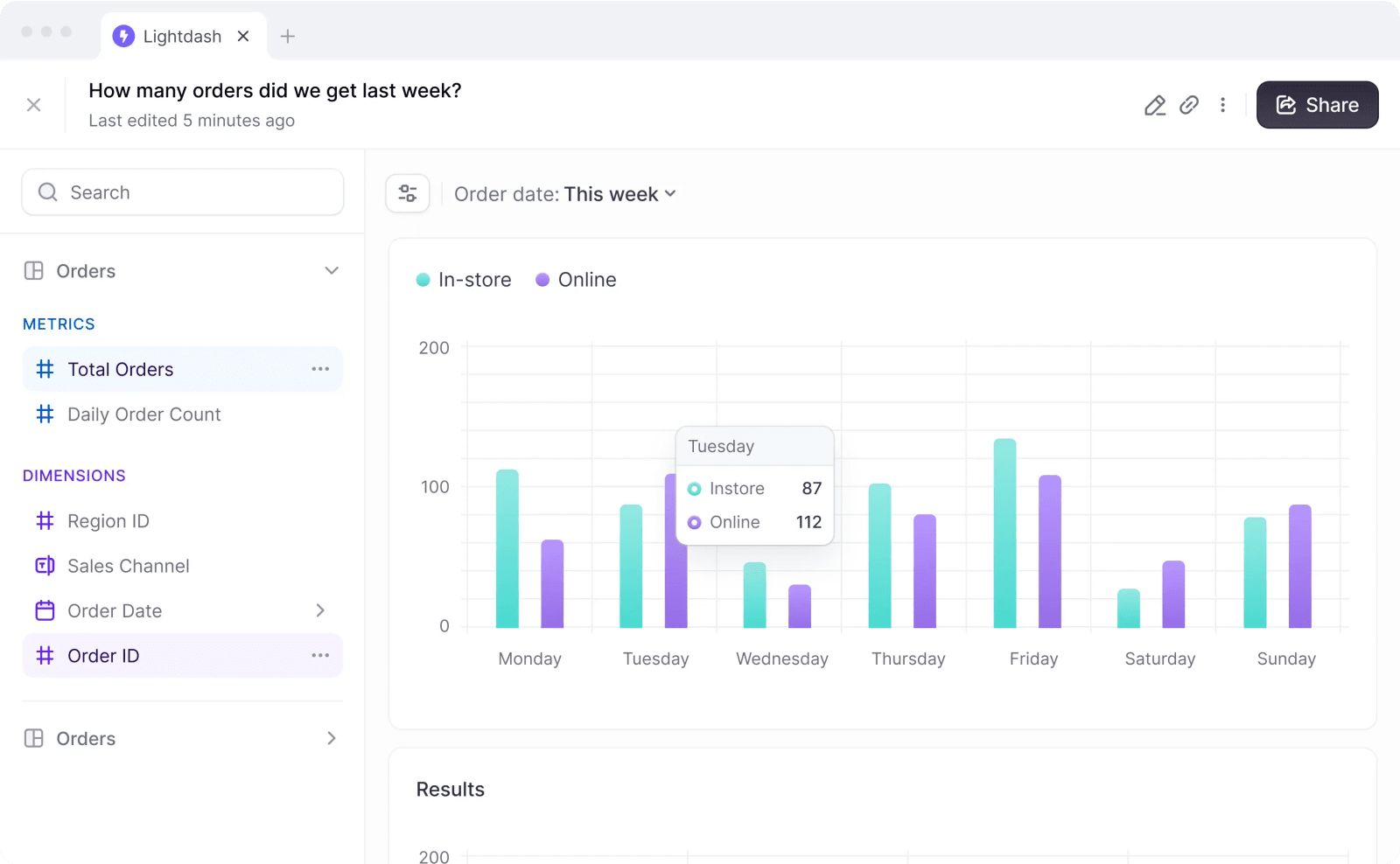
Lightdash makes it easy to turn your dbt project into BI dashboards easily.
Once set up leveraging your existing dbt models, it makes creating visualizations easy. These don't require SQL and instead rely on their data catalog, pre-built metrics, and point and click explorer. It also includes an AI analyst co-pilot to help users self-serve their data needs.
Although reliant on dbt, Lightdash also provides integrations for warehouses, version control tools (like GitHub), alerting (Slack), and sharing. This helps it easily connect to your existing stack.
What makes Lightdash special?
Lightdash has connected itself deeply to dbt. It literally markets itself as “The BI platform built for dbt.” Like Evidence, this lets teams manage everything (like dashboards) as code.
Lightdash's developer focus doesn't stop there. They also provide version controls, staging, automated testing, and CI/CD toolings.
FAQ
What tools does Lightdash replace?
Lightdash replaces BI tools like Looker (especially closely as their metric layer is modeled after LookML), Tableau, and Power BI. It also replaces the SQL + viz tools mentioned earlier.
Can it connect to my data warehouse?
Lightdash is reliant on dbt and has fewer integrations than other tools on this list, but still includes warehouses like Snowflake, PostgreSQL, Redshift, BigQuery, and Databricks.
Is there a hosted version?
Lightdash has a cloud hosted option that requires zero configuration, is updated daily, and enables unlimited users and visualizations. It starts at $800 per month with a 21-day free trial.
Does Lightdash have AI query generation?
Lightdash provides context-specific AI analysts that automatically select the most relevant models and metrics, build queries, and present insights.
What is the best free and open source business intelligence tool?
We're biased, but we think PostHog is one of the best free BI tools around, especially for startups and scale-ups who also need things like product analytics, feature flags, experiments, and error tracking.
It offers easy connectors to the sources you already use, easy-to-use visualizations, and a full SQL querying, and it puts all your data in one place so you can query product and company data together.
There's a generous free tier of 1 million events and 1 million rows synced for free every month if you sign up for our Cloud hosted version, too.
If you don't want an all-in-one platform like PostHog, the next best option is Metabase
PostHog is an all-in-one developer platform for building successful products. We provide product analytics, web analytics, session replay, error tracking, feature flags, experiments, surveys, LLM analytics, data warehouse, CDP, and an AI product assistant to help debug your code, ship features faster, and keep all your usage and customer data in one stack.









